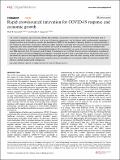| dc.contributor.author | Ramadi, Khalil | |
| dc.contributor.author | Nguyen, Freddy T. | |
| dc.date.accessioned | 2021-03-16T20:05:37Z | |
| dc.date.available | 2021-03-16T20:05:37Z | |
| dc.date.issued | 2021-02 | |
| dc.date.submitted | 2020-06 | |
| dc.identifier.issn | 2398-6352 | |
| dc.identifier.uri | https://hdl.handle.net/1721.1/130145 | |
| dc.description.abstract | The COVID-19 pandemic has profoundly affected life worldwide. Governments have been faced with the formidable task of implementing public health measures, such as social distancing, quarantines, and lockdowns, while simultaneously supporting a sluggish economy and stimulating research and development (R&D) for the pandemic. Catalyzing bottom-up entrepreneurship is one method to achieve this. Home-grown efforts by citizens wishing to contribute their time and resources to help have sprouted organically, with ideas shared widely on the internet. We outline a framework for structured, crowdsourced innovation that facilitates collaboration to tackle real, contextualized problems. This is exemplified by a series of virtual hackathon events attracting over 9000 applicants from 142 countries and 49 states. A hackathon is an event that convenes diverse individuals to crowdsource solutions around a core set of predetermined challenges in a limited amount of time. A consortium of over 100 partners from across the healthcare spectrum and beyond defined challenges and supported teams after the event, resulting in the continuation of at least 25% of all teams post-event. Grassroots entrepreneurship can stimulate economic growth while contributing to broader R&D efforts to confront public health emergencies. | en_US |
| dc.description.sponsorship | National Institute of Diabetes and Digestive and Kidney Diseases (Award F32DK122762) | en_US |
| dc.publisher | Springer Science and Business Media LLC | en_US |
| dc.relation.isversionof | https://doi.org/10.1038/s41746-021-00397-5 | en_US |
| dc.rights | Creative Commons Attribution 4.0 International license | en_US |
| dc.rights.uri | https://creativecommons.org/licenses/by/4.0/ | en_US |
| dc.source | Nature | en_US |
| dc.title | Rapid crowdsourced innovation for COVID-19 response and economic growth | en_US |
| dc.type | Article | en_US |
| dc.identifier.citation | Ramadi, Khalil B. and Freddy T. Nguyen." NPJ Digital Medicine 4, 1 (February 2021): 18. © 2021 The Author(s) | en_US |
| dc.contributor.department | Massachusetts Institute of Technology. Department of Mechanical Engineering | en_US |
| dc.contributor.department | Massachusetts Institute of Technology. Institute for Medical Engineering & Science | en_US |
| dc.relation.journal | NPJ Digital Medicine | en_US |
| dc.eprint.version | Final published version | en_US |
| dc.type.uri | http://purl.org/eprint/type/JournalArticle | en_US |
| eprint.status | http://purl.org/eprint/status/PeerReviewed | en_US |
| dspace.date.submission | 2021-03-10T18:50:43Z | |
| mit.journal.volume | 4 | en_US |
| mit.journal.issue | 1 | en_US |
| mit.license | PUBLISHER_CC | |
| mit.metadata.status | Complete | |
